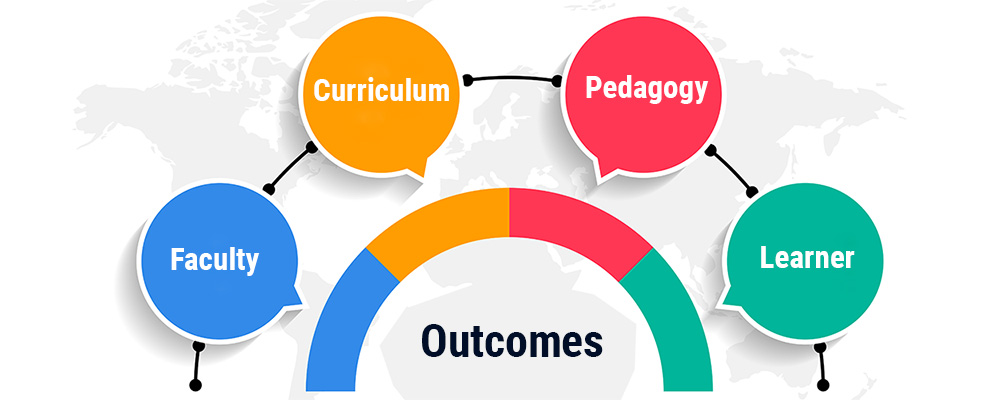
Taking the sequential discussion forward, IMC 2022 shall focus on the theme of Measuring MBA Outcomes.
MBA Education in India – Key Concerns
India is home to the largest number of MBA Programs in the World with highest number of MBA Students. According to AICTE, as in September 2022, there are 3153 Universities and standalone B-schools where about 4.2 lakhs students are enrolled. But do our
Indeed, MBA is a Professional Program that must aspire for better outcomes. As a professional degree, MBA is expected to provide advanced education to work as management professional. It is supposed to be a terminal degree. The unplanned growth of Undergraduate Management Education, with varied nomenclatures (BBA/BMA/BBS) further makes it imperative to clearly define what MBA degree ought to deliver. Hence it is significant to ponder as to how B-schools should measure the outcome of MBA education. This theme paper outlines key outcomes, and calls for thoughtful measurement matrix.
The Outcomes
Assessment of the value of education can be done at three levels: the Individual, the Organization, and the Society (Klein and Kozlowski, 2000). Educational institutions can confer three types of Human Capital upon their graduates (Useem and Karabel, 1986 quoting Becker 1964): Scholastic Capital (knowledge acquired), Social Capital (personal network developed), and Cultural
Capital (the value society places). To these, Baruch et al. (2005) added Inner Value capital (self-esteem and confidence earned), and Market Value Capital (improved remuneration).
Professional educational program like an MBA should ideally contribute to all three stakeholders: the Individuals studying at the program, often with high student-loans and foregone earning opportunities, the Organizations hiring talent, and the Society wishing to use research and knowledge.
Of course, there are other important outcomes like nurturing Entrepreneurs and Social Responsibility of the institutions. However, to limit the scope of the conference for in-depth discussions, focus shall be on above three outcomes.
While these outcomes are well known, special emphasis will be placed on developing measurement matrix of these outcomes. Peter Drucker famously said: If you can't measure it, you can't manage it. Bush et al (2022) opines “identify performance indicator that tracks outcome, not just inputs. Formal systems for collecting and tracking data should meet the same data quality standard as financial information.”
It is often seen that while B-schools understand the importance of above Outcomes, rarely are specific matrix developed and implemented rigorously. If B-schools can define and measure the desired outcomes, they can be more effective and generate the desired impact. Without adequate assessments of MBA outcomes, all stakeholders including students, businesses and B-schools themselves, cannot take actions necessary to improve their performance.
A brief overview of each outcome, and current areas of concern, follows.
Academic Learning Outcomes
The report card of B-schools in the form of Director’s report does claim Output Based Education framework in existence. It may also mention mapping of course outcomes with the program outcomes. But the report rarely talks about the academic learning standards attained by students during the year in any measure. Nor does it highlight at any stage what number of them have made it to higher academic pursuits.
A peculiar issue in our market is that a large number of B-schools permit students to join the job after fourth trimester with some patch-work for the remaining courses for the completion of degree. The pressure is mounted on faculty to clear these students in spite of low academic performance.
The question arises: Do B-schools consciously measure to ensure that foundation is well set? One may find courses after courses outlines where multiple choices, Mid Term (partially) and End term exams (partially) components are considered adequate to measure the academic learning. Several institute awarding professional degrees in India separately evaluate the acquisition of knowledge and the practical skills. The absence of standardized curriculum and evaluation system, in practice, across the MBA industry remains. The test-designing and evaluation is more or less governed by an internal system. Can we take grades awarded across B-schools as common measure to judge the standards of academic learning at a B-school?
MBA programs consist of courses that are interdisciplinary. The central issue in getting the foundation knowledge is the past academic background of the learners. It varies widely in our country in spite having the same bachelor degree. While admitting, do B-schools ensure admits are capable to get this level of academic education.
Finally, are B-schools continuously measuring the relationship between academic criteria of admits and their academic performance at the school, and their performance in industry or profession? Little research has been published in this domain.
Corporate Readiness Outcomes
Most of the B-schools state that one of the learning goals (outcomes) is to impart leadership competencies (inputs) needed by the corporates. Leadership is a complex phenomenon, and there is no singular way to approach developing leadership capability. Competencies are the capabilities to apply knowledge, which Boyatzis (2009) defined as, “the underlying characteristics of a person that lead to or cause effective and outstanding performance.” Therefore, this outcome has to follow the first outcome explained above.
In reality, leadership development has taken the place of foremost learning goal at most B-schools. The process adopted takes away more than 50% of students’ time in first year and it continues more rigorously in second year. Variety of activities are done. Several workshops on personality development, interviewing skills etc. are held. Special mentoring sessions by faculty, alumni and “experts” are arranged. It must be researched if these extra-curriculars and acquisition of functional skills certificates outside the syllabus divert students from the main stream of MBA education. It has been reported by a B-school that for a strength of about 700 students, the students arranged 55+ activities in a year apart from intercollege competitions participated by students outside the campus. Some studies have found that 60% of time is engaged by such activities as against 40% in academics over campus life.
Few researches exist that document these student engagements.
B-schools possibly have been judging themselves successful on churning corporate ready executive on parameters of 100% placement or average CTC achieved or highest package for a batch. It is considered as an outcome of MBA degree. However, it is not uncommon that the divorce happens quickly as enterprises either find students unsuitable for the position offered or MBA graduates leaving soon the firm. Anecdotal evidence suggests that more than 25% of MBA lose their first job within the 12-18 months of joining. Several reports have highlighted poor employability of MBA graduates.
These trends raise several questions.
Are B-schools conscious of making the right match? Do students get the desired offers or choices? Does it get linked with their ability? Do they measure its efficiency over the years? Do 5-10 years career in the first organization and the growth is kept as one of the measures of corporate readiness? Does the B-school move towards higher positions and higher compensation packages over the years? Does B-school expand its base of regular recruiters? How much of the placement is on account of alumni of the B-school? How many PPOs are acquired during summer? How many are accepted under long duration summer internship? One of the important stakeholders- employers can be seen as customer to judge the corporate readiness status of the school. Do Bschools have well defined ‘positioning’ in employment market? Do B-schools measure their performance against the position held and share it among all stakeholders to make further plans for next year? Do repositioning exercise conducted after 2-4 years?
Research Outcomes
Richard Osborne and Scott Cowen had remarked “Business schools must become learning organisations or else we will become increasingly irrelevant to a rapidly changing world that is assaulting our assumptions about society and its principal organisations. Business schools presume to teach other organisations and individuals to learn to manage in cyberspace while managing our own
systems as railroads with fixed tracks, schedules and destinations.”
The research effort should result in finding new optimum solutions to the industry problems. Concepts such as core competence, the capital asset pricing model and brand equity, all originated in academic research." Further, Govindarajan says "Knowledge creation cannot be divorced from knowledge dissemination."
Lately, the significant amount of time and effort of faculty in India is devoted to Research. MBA students are also involved in the process. Case-writing out of summer internship and paper presentation in academic conferences are commonly done with the help of students. The mushroom growth of Ph.D. or Fellow scholars have greatly assisted the MBA faculty to churn the research publication. Sadly, the number of the publications is the index of rating - one of the concerns of the B-schools. Some ratings are of course related to quality of publications. Of late, the quality of publication is getting noticed. ABDC classification is moving to FT publications or UT Dallas research parameters.
Typically the research output measured by B-schools in India include publication in peer-reviewed journals, peer-reviewed proceedings, peer-reviewed paper presentations, research monographs, faculty research seminars, publication in non- peer reviewed journals, books- text, research and edited, chapters in books, technical reports related to funded projects and publicly available research working papers, peer-reviewed cases with instructional material, instructional software, publicly available material describing the design and implementation of new curricula or courses. This is categorized as intellectual contribution and divided among learning and pedagogical research, discipline-based research and contribution to practice.
Barriers related to research efficacy, physical and information resources, fiscal resources, and time reportedly challenge research productivity. The outcome can’t be limited to number of publications in peer reviewed journals and its impact then what possible measures are.
Could it be how many of them have been path breaking in terms of new knowledge or relook at the existing knowledge. Has industry gained anything out of these researches? Do they engage faculty as consultant out of seminal work? Has industry identified faculty as subject matter or industry expert? Do they continuously work together to uplift the human society and add to sustainability of living? How much of the research inputs has resulted in knowledge transfer while teaching? Do B-school faculty get equitable time to research? How much of fund is devoted to do research than award the publishers?
In the context of above discussion, it is high time that B-schools sit back and look relevancy of the outcome achieved out of MBA education. It is significant since the jobs are changing. Corporates are looking for a different kind of mindset and set of skills among the pass-outs. Picking up new outcomes like entrepreneurship without adequately integrating them into the total delivery will not produce any results as is seen in the poor track record of B-schools in churning entrepreneurs. Maybe it is high time to get out of generalized outcome for a B-school given their standing in the market. For those B-schools who simultaneously focus on undergraduate business degree, the challenge of separating outcomes for two terminal degree is serious one.
Authors eagerly await discussions on these themes at IMC Conference. We also invite feedback to improve this paper. Please email to [email protected].


| IMC Event | Location | Theme | Date |
| 11th IMC 2021 | Held in MDI Gurgaon Campus | Learner Centric Management Education | December 20-21, 2021 |
| 10th IMC 2019 | Held in New Delhi | Effective MBA Faculty for 21st Century Management Education | August 2-3, 2019 |
| 9th IMC 2018 | Held at IIM Bangalore Campus | MBA Pedagogy for 21st Century Business School | August 3-4, 2018 |
| 8th IMC 2017 | Held at IIM Lucknow Noida Campus | MBA Curriculum for New Era | August 4-5, 2017 |
| 7th IMC 2016 | Held at IIM Ahmedabad | Institutional Leadership in Management Education | August 5-6, 2016 |
| 6th IMC 2015 | Held at ISB, Hyderabad | Enhancing B-school Competitiveness | July 29-30, 2015 |
| 5th IMC 2014 | Held in New Delhi | MBA EDU 3.0: Envisioning the Future | August 8-9, 2014 |
| 4th IMC 2013 | Held in New Delhi | Enhancing The Value of MBA | August 2-3, 2013 |
| 3rd IMC 2012 | Held in New Delhi | Survival of the Fittest: Lessons from the Best | August 9-10, 2012 |
| 2nd IMC 2011 | Held in New Delhi | Building a great B-school what's the new DNA? | August 11-12, 2011 |
| 1st IMC 2010 | Held in New Delhi | Rethinking and Rebooting Indian Management Education | August 13-14, 2010 |